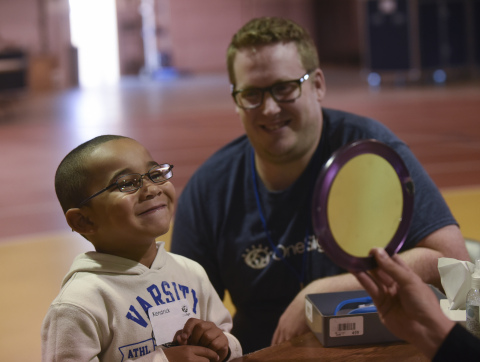CINCINNATI--(BUSINESS WIRE)--OneSight, an independent nonprofit committed to eradicating the global vision care crisis, today announced the findings from The Global Need for Glasses Study, which was conducted in collaboration with Deloitte. They revealed 1.1 billion people around the world need glasses, but don’t have access to vision care.
The study, which sought to determine how accessible vision care and quality eyewear are around the world, also found:
- Of the 2.5 billion people in the world that need glasses, 1.1 billion people lack access to glasses. That means 1 in 7 people around the world can’t see clearly because they do not have access to a simple pair of glasses.
- The crisis is most acute in Sub-Saharan Africa and Southeast Asia. In certain countries up to 44% of the population needs glasses but lacks the access to get them.
- There are 239 million children globally who need glasses, but lack access.
The study defined visual impairment by a child’s ability to perform well in school and an adult’s ability to be productive at work; access was defined by glasses being available at a price that people can afford. The study found that the ability to forgo wages for a day, pay for transportation and ultimately pay for vision care was a greater barrier than just the cost of glasses themselves.
OneSight’s mission is to eradicate the global vision care crisis in our lifetime through sustainable and charitable solutions. OneSight provides a comprehensive eye exam and the highest quality eyewear (from the OneSight Collection) made to each person’s prescription. This week, OneSight is operating charitable clinics in Detroit, Michigan; Richmond, Virginia; and Cuzco, Peru, providing these communities with much needed eye exams and free glasses.
“Clear vision can fundamentally change someone’s world and help unlock their full potential. Yet, for 1 in 7 people around the world, clear vision is not accessible. We can begin to solve this issue by bringing awareness to the global vision care crisis,” said Jason Singh, O.D., OneSight Executive Director. “We know the difference a simple pair of glasses can make in a person’s life. A child may be able to see the blackboard clearly for the first time. A parent may be better able to support their family by producing more at work, all thanks to clear vision. The immediate and long term impact is powerful."
On World Sight Day (October 8, 2015), OneSight is asking people to help give a voice to the 1.1 billion people who need glasses, but lack access by:
- Sharing a photo of yourself using your hands as glasses (i.e., hand glasses) with the hashtag #HelpTheWorldSee on your social media channels
- Donating $1 to help 1 billion people get access to glasses at www.onesight.org/worldsightday
- Watching and sharing a video about how access to glasses can impact the world at www.onesight.org/worldsightday
Leading sport performance brand, Oakley, has rallied behind the #HelpTheWorldSee campaign, enlisting several of their athlete ambassadors to help spread awareness. Ambassadors participating in the program include alpine skier Lindsey Vonn, professional skateboarder Ryan Sheckler and cyclist Chas Christiansen. Sunglass Hut’s global brand ambassador, Georgia May Jagger, is showing support of the campaign by posting her hand glasses photo on her social media channels.
For more information on OneSight and the #HelpTheWorldSee Campaign, visit www.onesight.org/worldsightday. Join the conversation with the hashtag #HelpTheWorldSee.
About World Sight Day
World Sight Day is a global day of awareness to focus attention on blindness and visual impairment. It is coordinated annually by the International Agency for the Prevention of Blindness (IAPB). On World Sight Day, IAPB raises public awareness of blindness and vision impairment as major international health issues.
About OneSight
OneSight, a global nonprofit 501(c)(3) sponsored and founded by Luxottica, is dedicated to providing sustainable access to a comprehensive eye exam and quality eyewear to those in need around the world. In 27 years, OneSight has helped 9 million people in 41 countries and 47 states see clearly and leading innovative programs and partnerships to help millions more.
About The Global Need and Access to Glasses Study
Deloitte used a refined top-down approach layering population estimates with visual impairment parameters followed by access proxies in order to estimate the global need for glasses. The approach took the 2015 population estimate and age distribution by country, and utilized a visual impairment definition of “clinically significant myopia of < -1D or Hyperopia of >3D,” while also assuming presbyopia for all adults over the age of 50, and for a percentage of the younger mature population. Finally, the approach layered on a financial access proxy by looking at the percentage of the population living on less than $2 a day or the percentage of the population living below the National Poverty Line, whichever was higher. This dynamic model allowed both a global estimate of the size of the need for glasses, while also allowing Deloitte to pinpoint which areas where the crisis was most severe.




